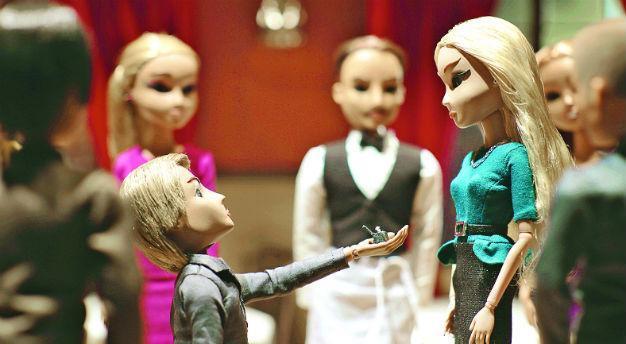Festival on a journey to ‘change perspectives’ about borders
ISTANBUL

The fourth Changing Perspectives Festival (ICPSFF), organized by Katadrom Arts Cultural and Politics Association and their international team, will start on May 5 in Istanbul.
The festival will focus on the theme of “borders,” emphasizing hybrid, global issues, cultural encounters, minority rights and social justice, a timely choice as the future of millions of Syrian refugees and others from other conflict-hit parts of the world is being discussed by all, both in the political realm and on a more individual level.
The ICPSFF will feature 95 short-films from 47 countries, divided in 10 sections and 3 different venues for screenings. It will provide a wide spectrum of short films from all over of the world, along with Q&A’s with directors and workshops. All events are free of charge and all of the films were carefully selected to provoke and expand horizons.
The films cover a large range of topics, seeking to blend life-changing experiences, strong characters, deep insights on unknown places and worlds, circles of past and future, different visions of childhood and its meanings, animations and documentaries that question reality and truth. The festival has been divided into the following sections: “Border,” “Cultural Insights,” “Exchange Experience,” “Hybrid Sensation,” “Kaleidoscope,” “Purple Portraits,” “Ridicule,” “So Far,” “So Close,” “Spooky” and Swerve Away.
As a travelling festival, Changing Perspective Selections already migrated to places such as Tallinn, Madrid, Oldenburg, Sofia, Klagenfurt, Luneburg and Copenhagen.
After Istanbul, the “Welcome to Stay- International Refugee Congress” will be held in June at Leipzig.
Though the festival features a large variety of countries’ films and film makers, one will not find information regarding the films’ “countries of production” as the festival wants to foster a borderless understanding of the world.
Workshops and exhibit to be held
Hundreds of thousands of people have left everything behind them to take the dangerous journey from Turkey to Greece in boats, with the dream of living a peaceful life somewhere in Northern European countries. But Europe has decided that enough refugees have come to their countries. Instead of working side by side, new fences are being built in places where old fences were torn down, countries with human rights issues are being declared as “safe” and inhuman deals are made. A young man in Idomeni wrote, “I see only Humans, not Humanity” on his pictures – the whole crisis in just a sentence.
Charlotte Schmitz, a German photographer based in Istanbul, took her camera and went to different places where she photographed people and let them write whatever thoughts they wanted to share on their pictures.
Her exhibition, “Take me to Jermany,” will show at SUPA, located in the Suriye Pasajı on Istiklal Street and will last until May 15.
As part of the festival, three different workshops will also be held at SUPA on May 6.
At 2 p.m., the workshop “Cultural Borders and Psychological Barriers,” run by Gülseli Baysu and Canan Coşkan, will focus on personal borders as well as social and cultural identities and how to overcome them.
The duo will present on how identities are intersectional and intertwined, and how we must shift from categorical thinking to intersectional ways of perceiving others in order to overcome the existing stereotypes and prejudices towards the “other” at the cultural and international levels.
The “Crossing Border” workshop, led by Yusuf Öz, will examine movie clips in which borders and acts of border crossing are represented. Based on these cinematic instances, the place and significance of borders in filmic imagination will be discussed. The workshop will take place at 4 p.m.
“Borders, Migration and Media” by MAVIBLAU (Marie Hartlieb and Tuğba Yalçınkaya) is a workshop that explores the history of nation building, how the effects of migration have shaped our understanding of nationality, and the representation of this process in media by emphasizing the cultural and social relations between Germany and Turkey. Set to take place at 6 p.m., the workshop will be a mixture of input, media analysis and discussions.
 The fourth Changing Perspectives Festival (ICPSFF), organized by Katadrom Arts Cultural and Politics Association and their international team, will start on May 5 in Istanbul.
The fourth Changing Perspectives Festival (ICPSFF), organized by Katadrom Arts Cultural and Politics Association and their international team, will start on May 5 in Istanbul.